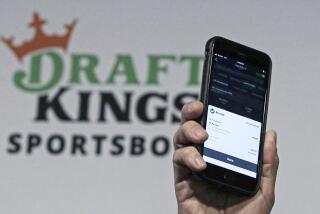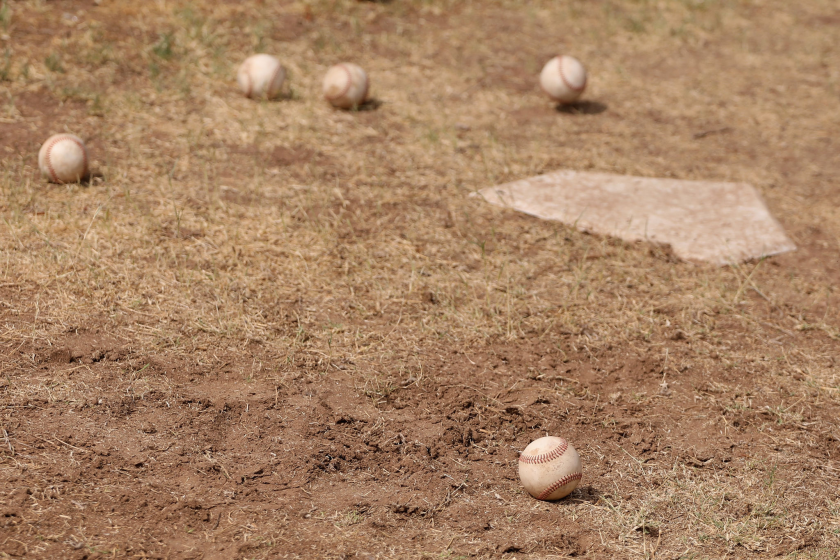COMMENTARY : There Isn’t a Lot We Know About Compulsive Gambling
- Share via
It was at the baggage carousel at LaGuardia Airport, coming home from the Giants’ triumph in Tampa. “Go big Blue,” Sam shouted to the friend who had come to pick him up.
“Yeah,” the friend responded, “that safety cost me $1,000 in the halftime score.”
So the favorite team won a thrilling game, but the joy was in the action, not in the playing.
A lot of us have difficulty recognizing the compulsive gambler as an addict. We’ve all said, “I betcha ...”
Who of us hasn’t bought a lottery ticket or put a dollar in a Super Bowl pool or put some money in the stock market, the biggest of all gambles? Not everybody who drinks wine with dinner is an alcoholic.
But some people can’t stop. You can’t smell it as you do alcohol and you can’t test for it as you do cocaine, but if we can accept them as addicts, the pull of action is as desperate. We don’t know enough about it.
“There’s never been a federal penny to study the compulsive gambler,” said Arnie Wexler, executive director of the Council on Compulsive Gambling of New Jersey, himself a “recovering gambler.”
We know the problem is there. The rate of recovery is about the same as for a drug addict, maybe 20 percent.
Scientific research tells us vast numbers; the pain is in case histories.
“Monday morning I had a panicky call from a 17-year-old kid,” Wexler said. “He said he lost $4,000 on the Super Bowl. Now, where does a 17-year-old get that kind of money to bet? He must have been doing it a long time. He said Buffalo couldn’t lose.”
Wexler tells of his own addiction, 23 years in the recovery stage.
“I had no interest in sex,” he said. “Either I was so high because I had won or I was so depressed because I had lost. On those rare occasions when I did make love with my wife, I had a radio under the pillow so I could get the scores.”
“I know of people who’ve gone to a funeral with a small radio so they could get the scores while they were saying a prayer over a relative’s coffin,” said Don Thoms, director of St. Vincent’s Gambler Treatment Program on Staten Island.
The racetrack has its own justification for those people who can take it as a few hours of entertainment. The lure of OTB goes another step, but 20 minutes between horse races is too slow. The ballgame has a million contests: Bet on the last digit of the quarter scores ... In the film “Beat the Devil,” two men bet on which of two sugar cubes a fly would land.
“You know there will be betting on the World League of American Football, too,” said Chris (Gamblers Anonymous uses only first names), a counselor in the program conducted out of Jewish Family Serivces in Buffalo.
The New Jersey legislature has a proposal to introduce sports betting in the Atlantic City casinos. The New York legislature has looked at it in the past and no doubt will again.
With cable TV in so many homes and home-video shopping growing, we’ll be able to sit in the living room and punch in a bet on the Georgetown-St. John’s game -- or even a bet on the high-school game brought from across the country.
Evidence says serious gambling problems develop about age 13 or 14. The big events in sports are terrible magnets for the addicted: The Super Bowl, the World Series, the Final Four. They’re in the papers, on TV every day. The odds and the point spreads, the over-unders are there as a public service. They’re next to the formal injury lists that were instituted so professional gamblers couldn’t corrupt team officials into providing exclusive inside information.
Big events get the gambler’s juices flowing. The advertising in the papers and on TV are indoctrination for the beginner; they are kids’ games, after all. It’s convenient to blame the bookmaker, but all he does is provide the service and maybe some credit.
Gamblers Anonymous advises clients to walk away when sports comes on the nightly news. Wexler says to this day he can see 15 seconds of the end of a race on the news and immediately make his mind bet on “the inside horse, the gray one or No. 7.”
At this time he can resist. At one time he couldn’t. He went off to summer camp at Fort Drumm in the Army Reserves and left a standing bet on the Mets to win every game, the Yankees to lose every game and a bet on every race ridden by three favored jockeys. “When I came back, I asked, ‘How did I do?”’ Wexler recalled.
He didn’t even have access to schedules or scores but he knew he had action going. Just the fact of putting a bet down is a high, like the rat in the Skinner box getting reinforcement from the sound associated with a food pellet even if there is no food pellet.
Wexler tells of a recent phone call from a client he’s been trying to help, a client who has been gambling heavily since he was 16. He bet in the casino until his credit ran out, then he used his bank cards until they ran out and then his credit cards. When they ran out he phoned the card companies, said he was his father and had lost his cards, and new ones were sent Fed Ex and posthaste.
At the time of the call he was panhandling on the streets of Las Vegas, his hotel had throw him out and kept his clothes, and he hadn’t changed or washed in eight days.
Chris, the GA man in Buffalo, tells of betting $2 and $5 on baseball in the early ‘80s and keeping pace for a while by getting job promotions. Progressively he went through his savings and personal loans, second mortgage and illegal loan sources. “
Once he was embarrassed he couldn’t pay for a family picnic and borrowed from his eldest son. His wife threatened to leave if he didn’t stop gambling, and then left. And came back. And he convinced her to give him access to $1,000 in a joint account with a son who was overseas in the military. And she left again.
And so it went until he sought help.
More to Read
Go beyond the scoreboard
Get the latest on L.A.'s teams in the daily Sports Report newsletter.
You may occasionally receive promotional content from the Los Angeles Times.










